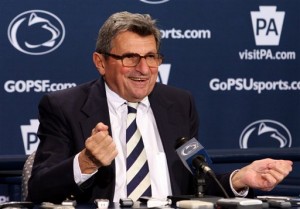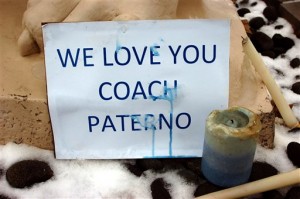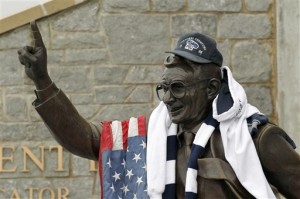 Let me preface this article by saying that I am not a Penn State fan. I never have been, and I never will be. I used to be a Notre Dame fan, but in the past few years I’ve become more of a broad-scale college football fan.
Let me preface this article by saying that I am not a Penn State fan. I never have been, and I never will be. I used to be a Notre Dame fan, but in the past few years I’ve become more of a broad-scale college football fan.
That being said, I just want to set something straight. I want to make sure everyone remembers who Joe Paterno was.
Paterno, the head coach of Penn State football for 44 years before his ousting midway through last season, passed away this past Sunday, Jan. 23. He left behind a legacy that, to some, is tainted by the assumption that he didn’t do enough to stop former Penn State assistant coach Jerry Sandusky from molesting young boys, charges that Sandusky is currently being tried on. Paterno, for the record, was never charged with anything in the case and was only asked to make one court appearance in the time before his death.
However, I want to remind everyone about the other part of Joe Paterno’s legacy — the football part. The part that made him arguably the greatest college football coach of all time, let alone one of the greatest coaches of all time, period.
Paterno played college ball for Brown University, in one average season at quarterback in 1949. He threw for 337 yards, rushed for 140 and even returned kicks, taking one back for a touchdown. Not all-star numbers, but he wasn’t awful either.
Paterno’s college playing career is hardly remembered, however, because his coaching résumé is not comparable to any other coach in the history of football. Or, again, in sports in general.
He started his career with the Nittany Lions in 1950 as an assistant coach. Paterno served under coach Rip Engle during Engle’s entire time with the team from 1950-1965, and took over the team in 1966.
Paterno coached the Nittany Lions for 44 years and part of a 45th, a single-team number that is the biggest in Division I history. Only one coach, John Gagliardi of Division III St. John’s University in Minnesota, has coached one team for a longer tenure in college sports. But in a constantly-revolving coaching carousel in Division I football that sees coaches ousted for one losing season at times, Paterno’s tenure is made even more impressive.
Paterno coached the most games in Division I history with 548. He won the most games as well, posting a number of 409 that is eons higher than the next coach on the list, retired Florida State coach Bobby Bowden, with 346. He has 37 bowl appearances, again considerably ahead of the next best coach on the list (Bowden again with 33). He posted 24 wins in those tries, also the best in history.
He was Sports Illustrated’s Sportsman of the Year in 1986, an award given to the sports personality who conducts himself the best on and off the field in any given year. He won 26 various Coach of the Year awards during his time at Penn State, eight of those coming during Penn State’s Orange Bowl run in 2005, when they prevailed over Florida State. 
Paterno was also not one to hold onto his job if he wasn’t deserving of it. At one point in the 2004-05 offseason, Paterno conceded that he would leave his post if the team wasn’t having success under him anymore. The previous four years had resulted in a 26-33 record for Paterno — well below his usual standards. People were calling for his job, saying that his age had caught up to him and he wasn’t capable of coaching anymore. Paterno gave himself a one-year ultimatum, that if he didn’t win that season he would call it quits. Well, he did the former, finishing with an 11-1 overall record and besting Florida State in the Orange Bowl.
Paterno’s efforts off the field can’t be overlooked either. He was a strong proponent of student athletes getting their degrees and being prepared for a life after football, and Penn State’s above-average grades for its football players was a testament to that.
He also donated over $4 million to the school, including contributions toward the Penn State All-Sports Museum, which opened in 2002, and the Pasquerilla Spiritual Center, opened in 2003. Paterno also helped raise and gave funds for a wing of Penn State’s library, which was named Paterno Library after the legendary coach.
I guess my main point in all of this is, try to remember JoePa for what he was, not what he has been turned into. He wasn’t the one raping the boys. He was a man who made a mistake. But that one mistake shouldn’t overshadow a lifetime of sports greatness and humanitarianism. 
So, I ask this. Remember Joe Paterno, the coach, the humanitarian, the cheery, resilient old man. Try not to remember him as this cover-up artist that he has been painted as in recent months. He is a man that made one mistake in a lifetime of good. Let’s try to remember the good, and forgive him for some of the bad. Everyone makes mistakes, and Paterno was no different.






